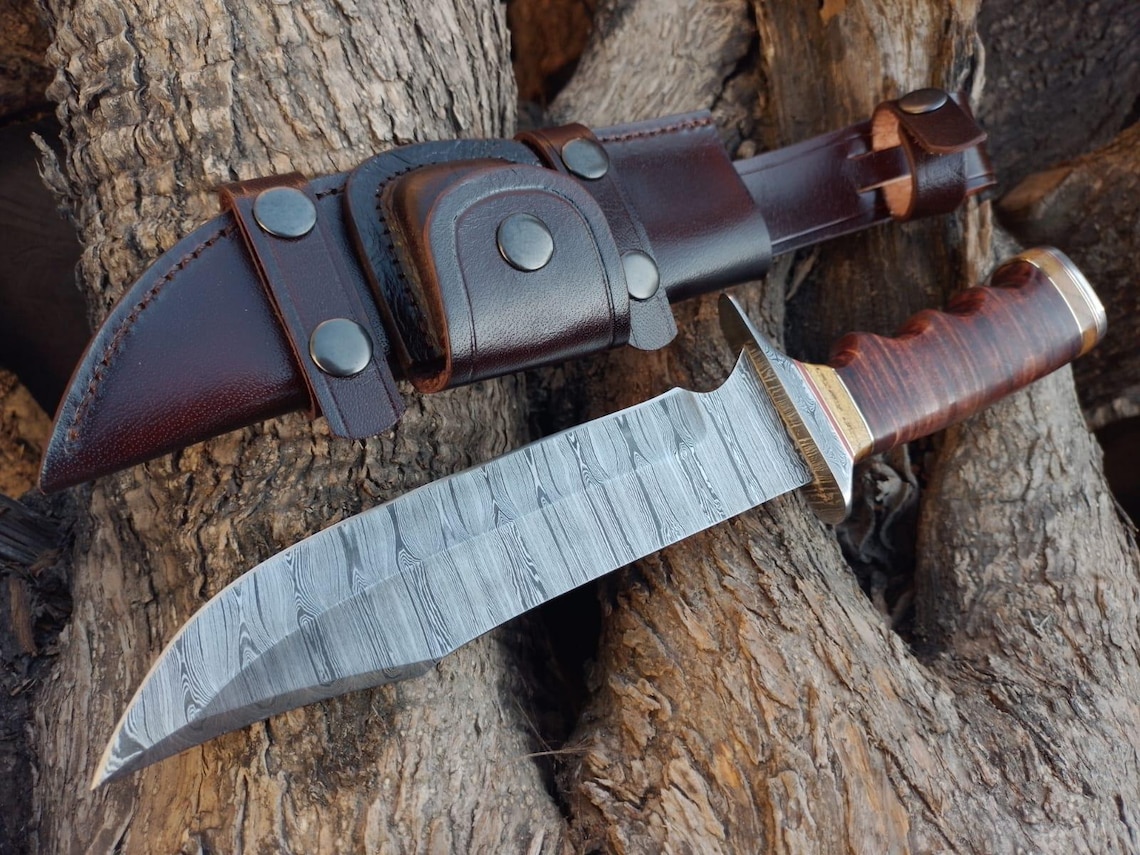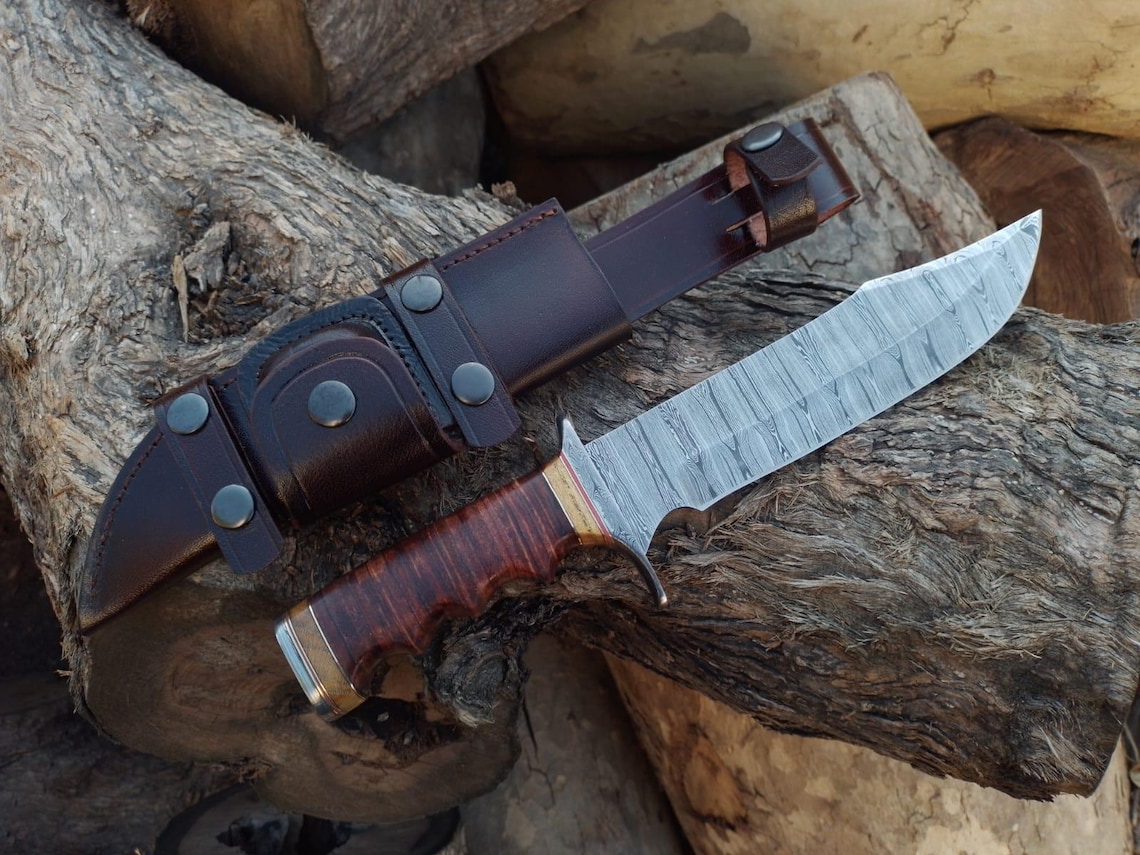The Damascus Hunting Knife: A Blade Forged in Legend and Fire
The Damascus Hunting Knife: A Blade Forged in Legend and Fire
Blog Article

For centuries, tales of legendary blades have captivated the human imagination. From King Arthur's Excalibur to Japanese katanas, the mystique of a perfectly crafted weapon transcends mere utility. Among these storied implements, the Damascus hunting knife stands as a testament to both ancient craftsmanship and enduring performance. It’s more than just a tool; it’s a piece of history, a work of art, and a reliable companion for any outdoorsman.
When you hold a Damascus hunting knife, you’re not just feeling steel; you’re feeling the echoes of countless hammer blows, the whispers of master artisans, and the raw power of nature’s elements meticulously brought together. This isn't your run-of-the-mill blade. No, this is something special, something that speaks to the very heart of the hunt.
What Makes a Damascus Hunting Knife So Special? The Art of Pattern Welding
Let's dive right into what makes a Damascus hunting knife so incredibly unique. The secret lies in a fascinating process called pattern welding. Imagine taking different types of steel, each with its own strengths – one for toughness, another for edge retention – and meticulously folding and forging them together, layer upon layer. It’s like baking a multi-layered cake, but instead of delicious frosting, you're creating a symphony of steel.
This isn't a new trick. Ancient smiths, long before modern metallurgy, discovered that by combining different steels, they could achieve a blade that was both incredibly strong and surprisingly flexible. The distinctive wavy, flowing patterns you see on a Damascus blade aren't just for show (though they are undeniably stunning). They are the visible evidence of these layers, each one contributing to the blade’s overall character and performance. It's truly a marvel of engineering, born from intuition and generations of trial and error.
The process typically involves heating several layers of different steels, twisting and folding them, then hammering them repeatedly. This intense forging welds the layers together, creating a singular billet. The more folds, the more layers, and the more intricate the final pattern. It's a dance between heat, pressure, and the smith's skilled hand, transforming raw materials into something truly extraordinary.
Beyond Beauty: The Performance of a Damascus Hunting Knife
While the aesthetic appeal of a Damascus hunting knife is undeniable, its true value lies in its exceptional performance. This isn't a showpiece you hang on the wall and admire from afar (though you certainly could!). This is a working tool, a resilient companion designed to excel in the demanding conditions of the wilderness.
One of the primary benefits of a Damascus hunting knife is its superior edge retention. Thanks to the varying hardness of the different steel layers, the blade develops a micro-serrated edge that stays sharper for longer. Think of it like tiny, microscopic teeth that allow the blade to slice through materials with incredible efficiency. This means less time sharpening in the field and more time focusing on your pursuit. For any hunter, that’s a massive advantage.
Furthermore, the layered construction of a Damascus hunting knife provides an impressive combination of toughness and flexibility. Unlike a monolithic blade that might be prone to snapping under extreme stress, a Damascus blade can absorb impact and flex without fracturing. This resilience is crucial when you’re relying on your knife for essential tasks, from field dressing game to preparing a campsite. It's a blade that won't let you down when the going gets tough.
The Enduring Appeal of the Fixed Blade Knife
Speaking of reliable companions, let's talk about the fixed blade knife. While folding knives offer convenience, a fixed blade knife like a Damascus hunting knife provides unparalleled strength and stability. There are no moving parts to fail, no locks to disengage, just a solid, unwavering piece of steel from tip to pommel. This inherent simplicity translates directly into dependability, which is paramount in a survival or hunting scenario.
Imagine you're deep in the woods, far from civilization, and you need to rely on your tools. A fixed blade knife gives you peace of mind. Its full tang construction (where the blade steel extends all the way through the handle) ensures maximum strength and prevents the blade from separating from the handle under heavy use. This is why a fixed blade knife has been the preferred choice for serious outdoorsmen and survivalists for generations. It’s robust, reliable, and ready for anything.
The design of a fixed blade knife also allows for a wider range of tasks to be performed with confidence. Batoning wood, prying, or even using the spine of the blade for striking a ferro rod are all operations that a fixed blade can handle with ease, something a folding knife simply isn't designed for. This versatility makes a fixed blade knife an indispensable tool in any outdoor enthusiast's kit.
Choosing Your Damascus Hunting Knife: What to Look For
So, you’re convinced a Damascus hunting knife is for you. Excellent choice! But with so many options out there, how do you pick the right one? Here are a few key factors to consider:
Understanding the Steel Composition of a Damascus Hunting Knife
While "Damascus" refers to the pattern welding process, the type of steel used in those layers significantly impacts performance. High-carbon steels offer excellent edge retention and hardness but can be more prone to corrosion. Stainless steels, on the other hand, resist rust better but might not hold an edge as long. Many modern Damascus blades use a combination of these, offering a fantastic balance. Don't be afraid to ask the maker about the specific steels they've used. This knowledge will help you understand the knife’s strengths and weaknesses, allowing you to choose a Damascus hunting knife that perfectly suits your needs.
The Importance of Handle Materials for Your Fixed Blade Knife
The handle of your Damascus hunting knife is just as important as the blade itself. It needs to provide a secure and comfortable grip, especially when wet or cold. Popular materials include wood (stabilized for durability), Micarta (a composite material known for its toughness and grip), G10 (another durable composite), and even bone or antler for a more traditional aesthetic. Consider how the knife feels in your hand. Does it offer good control? Is it balanced? A well-designed handle reduces fatigue and enhances your ability to perform precise tasks.
Ergonomics and Balance: A Crucial Aspect of a Damascus Hunting Knife
Hold the knife. Does it feel like an extension of your hand? A well-balanced Damascus hunting knife will feel lively and controllable, not heavy or cumbersome. The balance point is often just behind the guard, allowing for nimble manipulation. Poor balance can lead to hand fatigue and make delicate tasks difficult. Don't underestimate the power of a knife that feels "right" in your hand. This is often an overlooked aspect, but it truly makes a difference in prolonged use.
Sheath Quality for Your Damascus Hunting Knife
A great Damascus hunting knife deserves a great sheath. Kydex, leather, and nylon are common materials. A good sheath will securely hold the knife, protect the blade, and allow for easy and safe deployment. Consider how you'll carry the knife – belt loop, neck carry, or pack attachment – and choose a sheath that facilitates your preferred method. The sheath isn't just an accessory; it's a vital part of the knife system, ensuring safety and accessibility.
Caring for Your Damascus Hunting Knife: Preservation for Generations
A Damascus hunting knife is an investment, and like any valuable tool, it requires proper care to maintain its beauty and performance. Here are a few tips:
Cleaning and Drying Your Fixed Blade Knife
After each use, especially when exposed to moisture or corrosive materials, clean your Damascus hunting knife thoroughly. Use warm, soapy water and a soft cloth, then dry it immediately and completely. Moisture is the enemy of steel, even stainless varieties, and can lead to rust. Don’t let it air dry; give it a good wipe-down.
Oiling Your Damascus Hunting Knife
Applying a thin layer of protective oil, such as mineral oil or camellia oil, to the blade will help prevent corrosion. This is especially important for high-carbon Damascus, which is more susceptible to rust. A lightly oiled blade will not only resist corrosion but also enhance the rich patterns of the Damascus steel.
Proper Storage for Your Damascus Hunting Knife
Store your Damascus hunting knife in a dry environment. Avoid storing it in its leather sheath for extended periods, as leather can absorb moisture and promote rust. A dry, breathable storage solution, like a padded case or a knife block, is ideal. You want to ensure that air can circulate around the blade.
Sharpening Your Fixed Blade Knife
Learning to sharpen your fixed blade knife is a valuable skill. Use quality sharpening stones or Damascus Hunting Knife a reputable sharpening system. Maintain the original edge angle and work slowly and carefully. A sharp knife is a safe knife, and a well-maintained edge will ensure your Damascus hunting knife performs optimally for years to come. If you're unsure, practice on an older, less valuable blade first, or seek professional sharpening services.
The Legacy of the Damascus Hunting Knife
The Damascus hunting knife isn't just a product; it's a living legacy. It connects us to a rich history of craftsmanship, to the ingenuity of ancient artisans who pushed the boundaries of what was possible with metal. Each time you wield a Damascus hunting knife, you’re participating in that legacy, honoring the traditions that have been passed down through generations.
Whether you're an avid hunter, a dedicated bushcrafter, or simply someone who appreciates exceptional craftsmanship, a Damascus hunting knife offers an unparalleled blend of beauty, performance, and history. It's a tool that will serve you faithfully, a piece of art that will inspire you, and a legend that you can truly call your own. So go ahead, embrace the legend, and find the Damascus hunting knife that calls to you. You won’t regret it!
Remember, a fixed blade knife of this caliber isn't just for heavy-duty tasks; its inherent reliability makes it an ideal choice for everyday utility around the camp or home. It’s always there, ready and willing to tackle whatever you throw at it. The tactile satisfaction of holding a well-made fixed blade knife is something that many enthusiasts cherish – a connection to a simpler, more robust way of life.
In a world increasingly dominated by mass-produced items, the Damascus hunting knife stands as a beacon of artisanal excellence. It’s a reminder that some things are still made with passion, skill, and an unwavering commitment to quality. So, next time you're considering a new blade, think about the patterns, the layers, the history, and the sheer power contained within a Damascus hunting knife. It might just be the last hunting knife you'll ever need.
 Report this page
Report this page